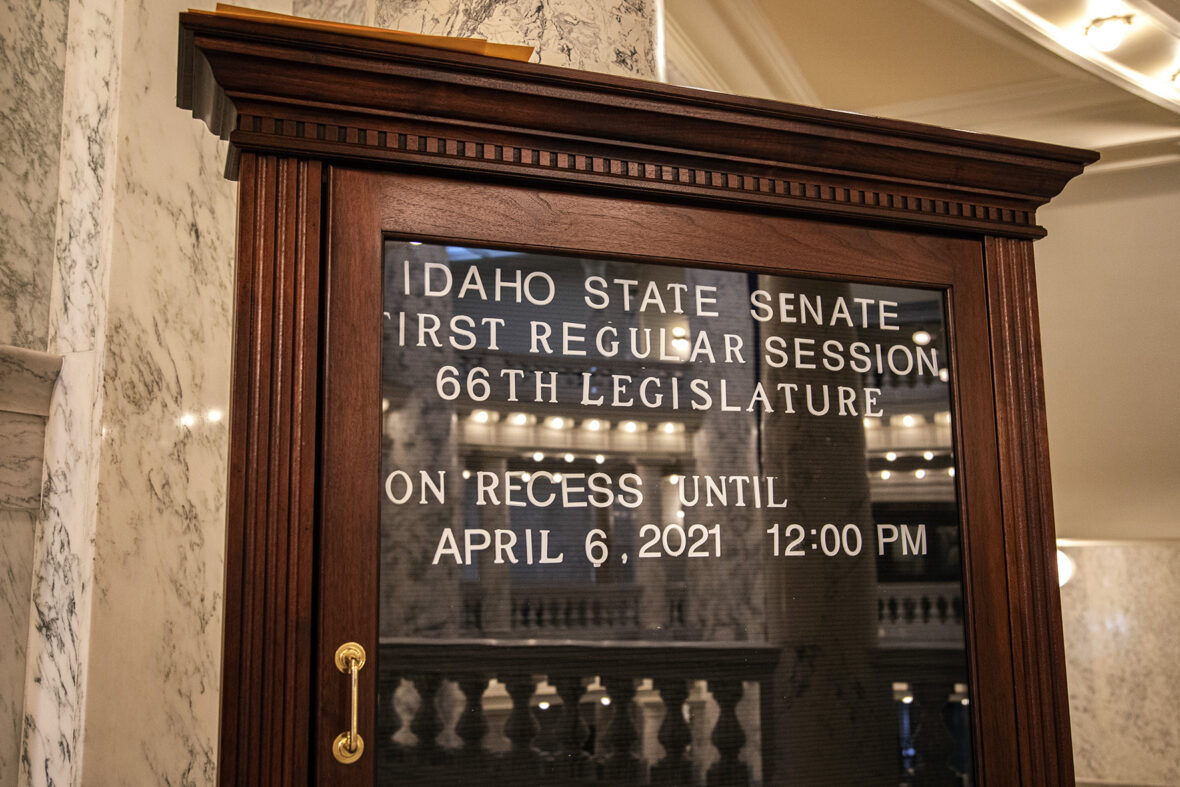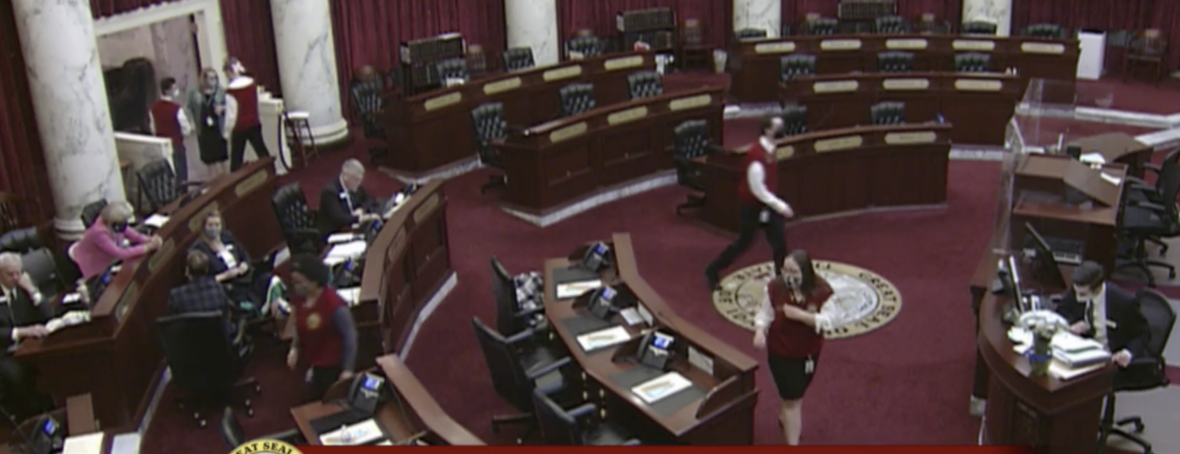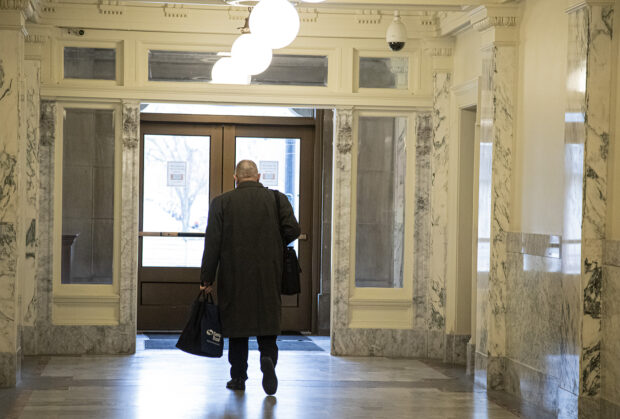
The Idaho Legislature is taking a historic 18-day recess after a rash of coronavirus cases in the Idaho House of Representatives.
In a very brief floor session, the House voted at 10:45 a.m. Friday to recess until noon on April 6, then promptly adjourned. The move, approved by voice vote, was made in concurrence with the Senate, said House Majority Leader Mike Moyle, R-Star.
Shortly before 11 a.m., the Senate convened, and Majority Leader Kelly Anthon said the Senate would recess “in concurrence with the request from the House of Representatives.”
The abrupt moves came after at least six House members tested positive for coronavirus within the past week. The recess also comes as lawmakers were trying to wrap up work for the year, aiming for a possible March 26 adjournment.

“This is a historic and kind of unusual request that’s been made of us,” said Senate President Pro Tem Chuck Winder, R-Boise, during the Senate’s perfunctory 20-minute floor session Friday.
But, as Winder noted, a joint legislative recess is not unprecedented. Senators requested a 10-day recess in 2000, when Senate President Pro Tem Jerry Twiggs died of a heart attack during a morning run, hours before the first day of the session was slated to begin.
For weeks, some lawmakers had already been talking about taking a recess and then reconvening in the spring. They had hoped to concentrate a spring session on the newly passed American Rescue Plan Act, and how the state should spend its multibillion-dollar infusion of federal stimulus dollars.
“We arrived there maybe just a little bit earlier than we thought we would,” said Anthon, R-Burley.
‘We still have work to do’
Anthon said he hoped lawmakers would work through the recess from their home districts, and return ready to resolve the important issues still on the Legislature’s docket, such as tax cuts and transportation funding.
“We need to emphasize that none of the things will be left undone, it just presses pause,” House Speaker Scott Bedke said in a news conference Friday morning. “Calendars, committee agendas … bills will be here when we get back. We still have work to do.”
Bedke, R-Oakley, said he’s directed House committee chairs to “finish what (they) have in the pipeline,” come April, but added new legislation will be considered on a case-by-case basis.
A highly anticipated proposal to fund all-day kindergarten was not introduced before the recess. Bedke said he expects it to be on the House Education Committee agenda the first day lawmakers are back to work.
‘We could have done so much better than this’
Over the past seven days, at least six House members have tested positive for coronavirus: House Education Committee Chairman Lance Clow, R-Twin Falls; House Education Vice Chairman Ryan Kerby, R-New Plymouth; Julie Yamamoto, a Caldwell Republican and House Education member; Bruce Skaug, R-Nampa; Greg Chaney, R-Caldwell; and James Ruchti, D-Pocatello. Bedke said Friday that at least one Statehouse staff member also tested positive for COVID-19.
“Once it got in the building, it spread through the building, basically in two committees,” Bedke said.
House Education was one area of spread, and the House Judiciary, Rules and Administration appears to be the other. Chaney chairs that committee; Kerby, Ruchti and Skaug are committee members.
Clow, Kerby, Skaug and Yamamoto all appointed interim lawmakers to take their place. But when the House gaveled into session at about 10:40 a.m., only 61 of its 70 members were on the floor.
 “I’m glad we are taking a pause as the spread accelerates,” House Assistant Minority Leader Lauren Necochea, D-Boise, tweeted before the floor session. “We could have done so much better than this.”
“I’m glad we are taking a pause as the spread accelerates,” House Assistant Minority Leader Lauren Necochea, D-Boise, tweeted before the floor session. “We could have done so much better than this.”
Bedke said he wasn’t surprised at the outbreak, but that he had “no regrets” about Statehouse safety protocols. The Legislature did not mandate its members to wear face coverings, and lawmakers adhered to social distancing guidelines only sporadically.
“I will never tell my peers what to do with their lives,” Bedke said. “We could have been a little more careful. I’m not saying we did everything perfectly, but we did pretty well.”
But by noon Friday, the Statehouse hallways were ghostly. Capitol security sat alone in the hallways, passed now and then by a lone legislator taking a call or leaving the building. Statehouse staffers turned off lights and microphones in committee rooms and grabbed plants on their way out the door so the greenery wouldn’t die unattended over the recess.

Truncated committee meetings
Before the floor sessions, a few committees met — and the word of a recess spread rapidly.
During a Senate State Affairs Committee meeting shortly after 8 a.m., Winder and Anthon told colleagues about the prospects for recess.
“(House members) have decided on their own to shut down their committees,” said Anthon, adding the Senate would be “courteous” toward House members’ wishes.
Senate State Affairs and House Education held truncated meetings Friday morning.
Meanwhile, the Joint Finance-Appropriations Committee abruptly called off its Friday morning session, which had been scheduled for 8 a.m.
“Canceling JFAC in light of the recent COVID outbreak at the Idaho Capitol,” Rep. Brooke Green, D-Boise, said in a tweet. “Awaiting floor session this morning so we can officially recess till April 6.”
Canceling JFAC in light of the recent covid outbreak at the Idaho Capitol. Awaiting floor session this morning so we can officially recess till April 6th. #idleg #COVID #coronavirus
— Brooke (@BoiseBrooke) March 19, 2021
Betsy Russell of the Idaho Press reported on Friday’s canceled JFAC meeting.
“It’s just that we want to take a break and let some of this settle,” said House JFAC co-chair Rick Youngblood, R-Nampa, according to Russell’s report.
House Education rushes to introduce new bills, prompts walkout
At 9 a.m. Friday, House Education held a seven-minute meeting where it rushed to introduce three new bills. Attendance was thin: Only nine of the committee’s 15 members were heard responding to roll-call votes.
Rep. John McCrostie, D-Garden City, tweeted that the committee’s three Democrats walked out of the meeting in protest over the bills to be considered.
House Ed Dems walked out of today’s hearing. They are introducing new bills to prevent discussing the civil war, WWII, women’s suffrage, etc., rather than addressing how to fund and improve Idaho schools. #idedu #idleg
— John McCrostie (@McCrostie4Idaho) March 19, 2021
Rep. Judy Boyle, R-Midvale, chaired the committee meeting in place of Clow and Kerby. Boyle started the meeting with a mandate: keep things quick.
“We will probably be adjourning the entire House here before long. We were allowed to hold this committee if we keep it extremely short,” she said. She told bill sponsors to keep their presentations short and said there would be no questions from committee members.
The group voted to introduce all three bills before them, with almost no discussion:
- A proposal by Rep. Wendy Horman, R-Idaho Falls, to create “community councils” at each Idaho school, made up of parents, teachers and the principal.
- A proposal by Dan McKnight, an Eagle football coach, to amend athletic rules to give parents who coach high school sports more flexibility to also coach clubs and recreational leagues.
- A proposal by Ed Humphreys of Eagle, to “prohibit teaching racist and sexist concepts in Idaho public schools.”
Reps. Steve Berch, D-Boise, Sally Toone, D-Gooding, and McCrostie told EdNews they left the meeting either because they were offended by the content of the bills, the procedure of rushing them to introduction without discussion, or both.
“To be told, ‘Two sentences and we’re out of here,’ was really a slap in the face of the process,” Toone said. “We need to be able to have a full discussion.”
McCrostie said the bills were “so inappropriate that it was not even worth being in the room to object.”
Democrats took particular umbrage with the proposal to “prohibit teaching racist and sexist concepts,” which got virtually no introduction or discussion before it was introduced. The bill comes as some legislators are taking aim at instruction of “critical race theory” in Idaho schools and universities. It also follows news this week of Boise State University canceling a diversity class after at least one student said they were degraded for their beliefs.
A copy of the proposal, provided to EdNews, says the bill would prohibit public schools from teaching:
- That one race or sex is superior to another race or sex.
- That an individual, because of their race or sex is inherently racist, sexist or oppressive “whether consciously or unconsciously.”
- That “an individual, by virtue of the individual’s race or sex bears responsibility for actions committed in the past by members of the same race or sex.”
- That merit-based systems are racist or sexist.
- And that Idaho or the United States are “fundamentally racist or sexist.”
Humphreys, who presented the bill, is listed on Facebook as the Region IV chair of the Idaho GOP.
Berch said he walked into Friday’s meeting to find a personal video camera had been set up behind the legislators to film the bill presentations. The camera was later moved, Berch said. He denounced the meeting as “political theater.”
“The fact that this bill came out of nowhere, was orchestrated at the 11th hour…when we’re about to adjourn for two weeks, this is beneath the dignity of the House Education Committee and demeans the stature of the entire body,” Berch said.
Boyle did not respond to EdNews’ interview requests.
Idaho Education News covered Friday’s floor sessions and committee meetings remotely.
